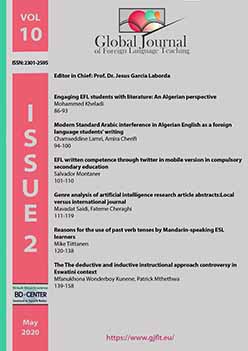EFL written competence through twitter in mobile version in compulsory secondary education
EFL written competence through twitter in mobile version in compulsory secondary education
Author(s): Salvador MontanerSubject(s): Education, Foreign languages learning, ICT Information and Communications Technologies
Published by: Birlesik Dunya Yenilik Arastirma ve Yayincilik Merkezi
Keywords: English as a foreign language; social networks; mobile-assisted language learning; written competence; summarising;
Summary/Abstract: The use of Information and Communication Technologies (henceforth, ICT) in foreign language learning and, to be more specific, in English language learning has increased quite considerably since the commencement of the 21st century and, particularly, in the second decade of the 21st century with the introduction of mobile learning (m-learning, henceforth) at our daily lives. Our aim, at this current paper, is to confirm whether use of the Twitter social network via a mobile device helps Spanish learners of English as a foreign language (henceforth, EFL) improve their quality of EFL written expression and, especially, their summarizing skill in the English language. We conducted a classroom experiment with students in Year 4 of compulsory secondary education at the time of the experiment. The participating students were level B1 according to the Common European Framework of Reference for Languages (henceforth, CEFR). Two research questions were established. Based on these, the following preliminary hypothesis was formulated: Use of the mobile version of Twitter has a positive impact on improving written expression and, to be more concrete, the summarizing skill in EFL. The research model, which we selected, was action research, in accordance with which quantitative data were analysed to justify the outcomes of this empirical research. The data were satisfactory since learners improved significantly at the end of this current classroom experiment. This research on the use of Twitter in its mobile version could imply a starting point to conduct further empirical studies in this respect on English language teaching and learning in non-university education, such as primary education, compulsory secondary education and Baccaulerette.
Journal: Global Journal of Foreign Language Teaching
- Issue Year: 10/2020
- Issue No: 2
- Page Range: 101-110
- Page Count: 10
- Language: English

